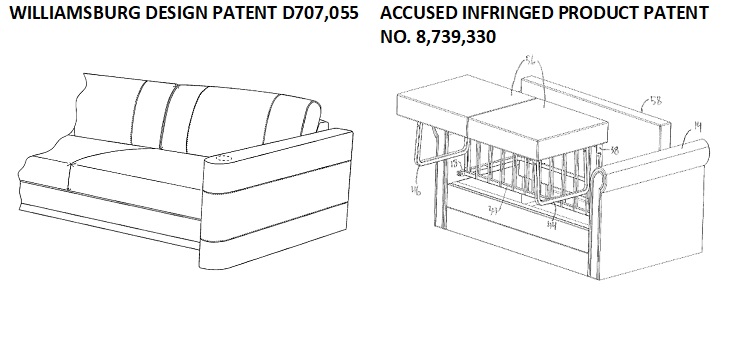South Bend, Indiana – Attorneys for Plaintiff, Williamsburg Furniture, Inc. (“Williamsburg”) of Nappanee, Indiana originally filed suit in the District Court of Delaware seeking a declaratory judgment of non-infringement against Defendant, Lippert Components, Inc. (“Lippert”) claiming Lippert’s United States Patent No. 8,739,330 (the “‘330 Patent”) is invalid and/or unenforceable. Williamsburg is also seeking judgment for false advertising and unfair competition as it claims Lippert informed Williamsburg’s customers of the alleged patent infringement and caused Williamsburg to lose sales. Upon motion by Lippert, the case was transferred to the Northern District of Indiana.
According to the Complaint, the invention claimed in the ‘330 Patent for a tri-fold sofa was publicly disclosed, in public use, on sale, or otherwise available to the public through third parties not associated with the ‘330 invention more than one year prior to the filing of the provisional patent application. For instance, Patrick Hutmacher claims he purchased a tri-fold chair/bed in August 2010 from a furniture store in McHenry. One month later, a person from the McHenry furniture store allegedly brought a second tri-fold chair/bed to Mr. Hutmacher at his place of employment, Flair Interiors, Inc. (“Flair”), in an attempt to supply the products to the company.
Apparently, after having sold neither of the tri-fold chairs at Flair, Mr. Hutmacher took the second chair and showed it to Williamsburg in an attempt to interest them in manufacturing similar products. Per the Complaint, one of the representatives of Williamsburg thought it had potential and used the tri-fold chair supplied by Mr. Hutmacher as the basis for the wider tri-fold sofa/bed product marketed under the “Visionary” model name by Williamsburg. Mr. Hutmacher claims he recalled seeing a prototype of the Visionary product in or around October 2011. On October 23, 2011, Mr. Hutmacher allegedly displayed the Visionary product at a trade show. He also claims to have seen a similar tri-fold chair/bed manufactured by a Chinese company in September 2011. In November 2011, through counsel, Williamsburg applied for a design patent for the Visionary product and was granted U.S. Patent No. D707,055 in June 2014.
Williamsburg claims Lippert knew of the Visionary product prior to conception of the invention claimed in the ‘330 patent, Lippert reduced to practice the claimed invention of the ‘330 Patent after its knowledge of the Visionary product, and Lippert failed to disclose the Visionary product to the Patent Office as prior art. Therefore, Williamsburg is seeking a declaratory judgment that the ‘330 Patent is both invalid and unenforceable.
The case was assigned to District Judge Robert Miller, Jr and Magistrate Judge Michael G. Gotsch, Sr. in the Northern District and assigned Case 3:20-cv-00110-RLM-MGG
 Indiana Intellectual Property Law News
Indiana Intellectual Property Law News


